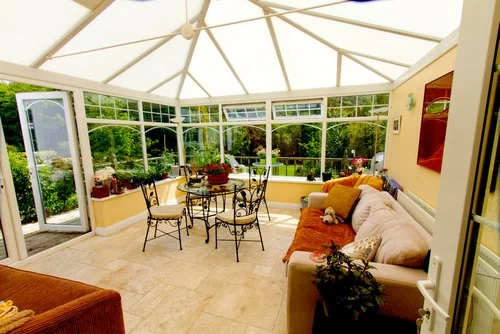Small extensions vs conservatories cost — which one is best for you?
If you want to create extra space in your house, you may be planning to design and build an extension.
You could also consider alternatives such as a conservatory. This route may be more affordable than small extensions cost.
We’ve written our latest post to compare the two projects. Our article will highlight the pros and cons of each approach and allow you to compare costs.
What you need to know about building a conservatory
First, let’s understand the definition of a conservatory. This structure has glass for two-thirds of the roof and half of the wall area. This compares to sun rooms and orangeries, which tend to have large windows instead of glazed walls.
Building a conservatory is usually straightforward but still takes some planning. Start by deciding on the type of design that suits your property. You can choose anything from a traditional Victorian look to a minimalist model.
Usually, you won’t need planning permission to build a conservatory if it falls within permitted development rights.
It should also be exempt from building regulations — standards to ensure your project is safe and energy efficient — as long as:
It is built at ground level.
The total area does not exceed 30m².
It has a heating system independent of the main house system.
It has external windows, doors or walls that separate it from the main house.
Electrical and glazing work comply with the relevant regulations.
Construction of your conservatory can be very quick — in many cases, two to three weeks.
What you need to know about building a small extension
Small extensions can take more planning than conservatories, although many can be built without planning permission if they meet certain criteria.
Consult an architect or builder to discuss your case, or read about planning permission on the UK Government website.
Any small extension must adhere to building regulations. And if you share a wall or boundary with a neighbour, the Party Wall Act may affect your project. This is a set of guidelines to avoid or resolve any disputes that can arise as a result of building work affecting a shared boundary or wall.
An architect can help with this and many other aspects of your project. These include the design of your project, preparing paperwork, and managing your build. It’s worth involving one from the outset to ensure that your project runs smoothly.
Know that a small extension project will be more lengthy than building a conservatory and is likely to have a greater impact on your day-to-day life.
Conservatory or small extension?
To answer this question, you first need to define how you are going to use the extra room.
For an additional bedroom, for example, a conservatory's glass walls and roof will be impractical. The same goes for a kitchen — glazing will make storage impractical. For both these cases, a small extension offers a better solution.
A small extension is better insulated since its solid walls retain heat better.
However, if you want your accommodation to connect to your garden, a conservatory offers an obvious choice. Glazing brings the outdoors inside, letting light in and showcasing garden views.
The other clear benefit of choosing a conservatory is a shorter project time with reduced disruption.
Small extensions cost vs conservatory cost
Small extensions are generally more costly than conservatories. That's due to a longer project time and costlier materials.
This figure can vary for different reasons, such as how big your extension is. In addition, you may wish to factor in the cost of an architect who specialises in extensions. Consider this an investment that could save you hassle and money in the long run.
As a general rule, a small extension will cost in the region of £1,500-£2,250/m² .
If you decide on a conservatory, you can negotiate a fixed price with your supplier. This can range from around £12,000 upwards, depending on the design and materials.
Reach out to Humphreys & Sons
Either a conservatory or a small extension could add the space you need. Your project can also increase the value of your property over the long term. For guidance on deciding which option is best, reach out to Humphreys & Sons, your local architects and chartered building surveyors for London and Essex.
Call us today for an informal chat about your plans to extend your home.






Architect fees - what do they include? We reveal all here.